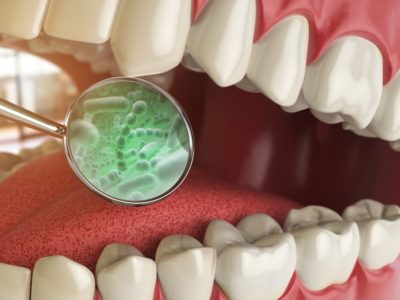Halitosis (Bad Breath) Treatment
You don’t have to live with chronic bad breath – a medical condition known as halitosis. There are ways to prevent it and eliminate bad breath once and for all.
Bad Breath/Halitosis Treatment
Halitosis, commonly known as bad breath, can be a distressing condition that affects not only your social interactions but also your self-confidence. The treatment for bad breath begins with identifying its underlying causes, which can range from poor oral hygiene and gum disease to more systemic issues such as digestive problems or sinus infections.
Effective halitosis treatment typically involves a comprehensive approach, including regular dental check-ups to remove plaque and tartar buildup, thorough brushing and flossing to clean away food particles and bacteria, and possibly changes in diet or habits, such as quitting smoking.
For those suffering from chronic bad breath, consulting with our dental professionals is crucial. They can provide personalized advice and treatment options, including professional cleanings, mouthwashes designed to neutralize odor-causing bacteria, and, if necessary, treatments for any underlying medical conditions contributing to halitosis. By addressing both the symptoms and the root causes, you can achieve lasting relief from bad breath and enjoy a fresher, more confident smile.

-
What causes bad breath?
Bad breath, also known as halitosis, can result from poor dental health habits and can be made worse by the types of foods you eat. The most common cause of halitosis is inadequate dental hygiene. If particles of food are left in the mouth, their breakdown by bacteria produces sulfur compounds. If regular brushing, flossing and hydration doesn’t solve it, the best solution is to see your dentist for a deep cleaning.
-
What is the best chewing gum for bad breath?
Chewing gum can help remedy bad breath until you are able to see your dentist for a deep cleaning. The best chewing gum is sugar-free chewing gum. The sweetness of this gum comes from sweeteners and not sugar, so it doesn’t cause tooth decay.
In addition to masking bad breath, chewing sugar-free gum helps protect your teeth and gums between meals. Teeth are more at risk of an acid attack directly after you’ve eaten. Chewing gum after a meal helps reduce acid and the harm it may cause to your teeth. It prompts the mouth to produce more saliva, which is the mouth’s natural defense against acid.
-
Does smoking cause bad breath?
Many smokers suffer from bad breath from time-to-time. Heavy smokers are usually more frequently affected, but occasional smokers also get bad breath. Studies suggest that smokers experience a deterioration in sensitivity, so you may not even realize you have bad breath or be able to smell it on yourself.
Bad breath in smokers is caused by the tobacco itself—the lungs retain a measure of the tobacco smoke for a while after the cigarette has been extinguished and these chemicals remain in the mouth, making a greater case for halitosis.
Another side effect of smoking is dry mouth, caused by bacteria in the mouth from tobacco. Dry mouth has a significant correlation to smoking, which is also a leading cause of halitosis. Dry mouth not only affects breath, but also affects gingivitis, making an even bigger case for the importance of regular dental checkups if you are a smoker.
More Questions?
If you have more questions about treatment for bad breath, please contact our office and we will be happy to discuss further.
